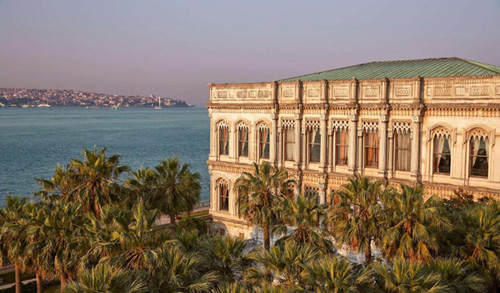I.P.O. Information Service
« The Bosphorus Roundtable »
Sovereignty and Coercion
The United Nations in the Web of Power Politics

Istanbul, 12
September 2024
RE/29571c-is
At an international roundtable consultation convened by the International Progress Organization (I.P.O.) at Çırağan Palace in Istanbul, scholars and politicians from Austria, Brazil, China, Denmark, Italy, Lebanon, Morocco, the Netherlands, Russia, Switzerland, Türkiye, and the United States discussed the contradictions between power and law and the resulting normative inconsistencies in the Charter of the United Nations that result from the post-war consensus among the founders of the UN, today’s permanent members of the Security Council. In a lively debate on the state of international relations, the participants examined possibilities of reforming the UN system to make it compatible with the evolving multipolar balance of power.
Referring to the forthcoming UN Summit of the Future, the President of the I.P.O., Dr. Hans Köchler, warned that the states that created the organization in 1945 are putting at risk its very future if they continue to refuse adaptation of the Charter to the new global realities. Sharing his observations as President of the 70th General Assembly of the United Nations, Mr. Mogens Lykketoft, former Foreign Minister and Minister of Finance of Denmark, said that the special position of the permanent members in the Security Council requires that they realize that their common interest in peace, prosperity and climate solutions is much more important – for themselves as well as the rest of the world – than their conflicts of interest. In remarks on the challenges to democracy in a multipolar world, Prof. Hassan Diab, former Prime Minister of Lebanon, described the negative repercussions of the veto power, in particular the risks of exacerbating conflicts and perpetuating impunity for human rights violations. Austria's former Minister of Foreign Affairs, Dr. Karin Kneissl, highlighted the gap between normative and factual (technical) sovereignty, emphasizing in particular the importance of permanent sovereignty over natural resources.
In general, the participants agreed that the Charter’s principle of sovereign equality of states stands in sharp contrast to the realities of power politics and that structural reform is needed to give meaning to the spirit of tolerance and peace enshrined in the organization's Preamble.
Upon conclusion of the roundtable, the President of the International Progress Organization hosted a banquet at the Ottoman Salon of Çırağan Palace.
The papers presented at the roundtable consultation will be
published by the International Progress Organization in the series
Studies in International Relations.
***
* Introductory Remarks by the President of the International
Progress Organization![]()
![]()
* Initiatives of the I.P.O. related to core
issues of the United Nations
![]()
Enquiries: info@i-p-o.org · Phone +43-1-5332877 · Fax +43-1-5332962 · Postal address: A-1010 Vienna, Kohlmarkt 4, Austria